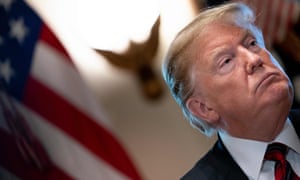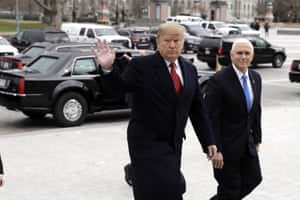
Donald Trump has strongly denied the stunning claim that he was secretly working on behalf of Russia and again threatened to declare a national emergency to fund a border wall.
In 20-minute live phone interview with Fox News on Saturday night, he described as an “insult” the New York Times story that alleged the FBI launched an investigation into whether the he was acting as a Russian asset, against his own country’s interests.
Trump said the story, which claimed the investigation opened after Trump fired the FBI director James Comey in May 2017, was “the most insulting article ever written”.
“I think [the story] was a great insult and the New York Times is a disaster of a paper. It’s a very horrible thing they said. They’ve gone so far that people who were not believers are now believers,” Trump said during the Fox News interview.
Citing anonymous sources, the Times said the investigation was part counterintelligence, to determine whether Trump was knowingly or unknowingly working for Moscow and posed a threat to national security. It was also part criminal, to ascertain whether Trump’s dismissal of Comey constituted obstruction of justice.
The FBI effort was soon absorbed into the special counsel Robert Mueller’s investigation of Russian interference in the 2016 election and alleged collusion between Trump’s campaign and Moscow, the Times reported, adding that it was unclear if the counterintelligence aspect is still being pursued.
The president again called Comey a “liar” and claimed the entire Russia investigation was a “terrible hoax”.
“Everybody knows it. It’s really a shame because it takes time; it takes effort. Everybody knows there’s no collusion,” he said.
Trump repeated baseless claims that the FBI mishandled an investigation into his election rival, Hillary Clinton. The president insisted that he had been far tougher on Russia than any other president, repeating claims he tweeted earlier on Saturday.
“I have been FAR tougher on Russia than Obama, Bush or Clinton,” he tweeted. “Maybe tougher than any other President. At the same time, & as I have often said, getting along with Russia is a good thing, not a bad thing. I fully expect that someday we will have good relations with Russia again!”
Trump’s warm relationship with the Russian president, Vladimir Putin, has long set alarm bells ringing. The day after firing Comey, he hosted Russia’s foreign minister, Sergey Lavrov, in the Oval Office – and disclosed intelligence from an Israeli counterterrorism operation. At a summit in Helsinki last summer, Trump appeared to side with Putin over his own intelligence agencies on the question of election interference.
On Saturday, the Washington Post reported that Trump took the notes from of a 2017 meeting with Putin in Hamburg from his own interpreter. Citing current and former US officials, the paper also said Trump instructed the linguist not to discuss what had transpired with other administration officials.
Asked why he would not release the conversations, Trump said: “I would. I don’t care … I’m not keeping anything under wraps. I couldn’t care less.”
In December the president startled his own national security officials by suddenly announcing the withdrawal of troops from Syria, widely seen as handing a strategic victory to Russia and prompting the defense secretary James Mattis to quit. He also bizarrely endorsed the Soviet occupation of Afghanistan in the 1980s.
The House intelligence committee chairman, Adam Schiff, said in a statement he did not “comment on the specifics of the New York Times report” but said “counterintelligence concerns about those associated with the Trump campaign, including the president himself, have been at the heart of our investigation since the beginning”.
His committee, he said, “has a responsibility to the American people to ensure that the president is working in our national interest and is not motivated by any other factor”.

Holed up at the White House, Trump turned to the other subject dominating US politics: the partial government shutdown which, going into its 23rd day, is now the longest in history, eclipsing the record set under Bill Clinton.
He called on the Democrats to do a deal and again threatened to declare a national emergency if they don’t “come to their senses”.
“I have the absolute right to call a national emergency,” he said. “Other presidents have called national emergencies for lesser importance than this. I’d rather see the Democrats come back from their vacation and act. It would take me 15 minutes to get a deal done and everyone could go back to work.”
Trump is demanding $5.7bn towards his long-promised wall on the US-Mexico border, claiming it will solve a humanitarian and national security crisis. Democrats, who control the House of Representatives, have passed measures to reopen the government without funding the wall, which they regard as an expensive, impractical and immoral response to a manufactured crisis. The result is a political stalemate that leaves a quarter of the government unfunded.
About 800,000 workers missed pay cheques on Friday. The House and Senate voted to give federal workers back pay whenever the federal government reopens, then left Washington for the weekend.
With polls showing Trump getting most of the blame, the president is toying with the idea of declaring a national emergency, bypassing Congress and funding the wall from existing federal revenue. Republicans are divided on the move and it would be certain to face legal challenges.
Since you’re here …
… we have a small favour to ask. More people are reading The Guardian’s independent, investigative journalism than ever but advertising revenues across the media are falling fast. And unlike many news organisations, we haven’t put up a paywall – we want to keep our reporting as open as we can. So you can see why we need to ask for your help.
The Guardian is editorially independent, meaning we set our own agenda. Our journalism is free from commercial bias and not influenced by billionaire owners, politicians or shareholders. No one edits our editor. No one steers our opinion. This is important as it enables us to give a voice to those less heard, challenge the powerful and hold them to account. It’s what makes us different to so many others in the media, at a time when factual, honest reporting is critical.
If everyone who reads our reporting, who likes it, helps to support it, our future would be much more secure. Support The Guardian from as little as $1 – and it only takes a minute. Thank you.
